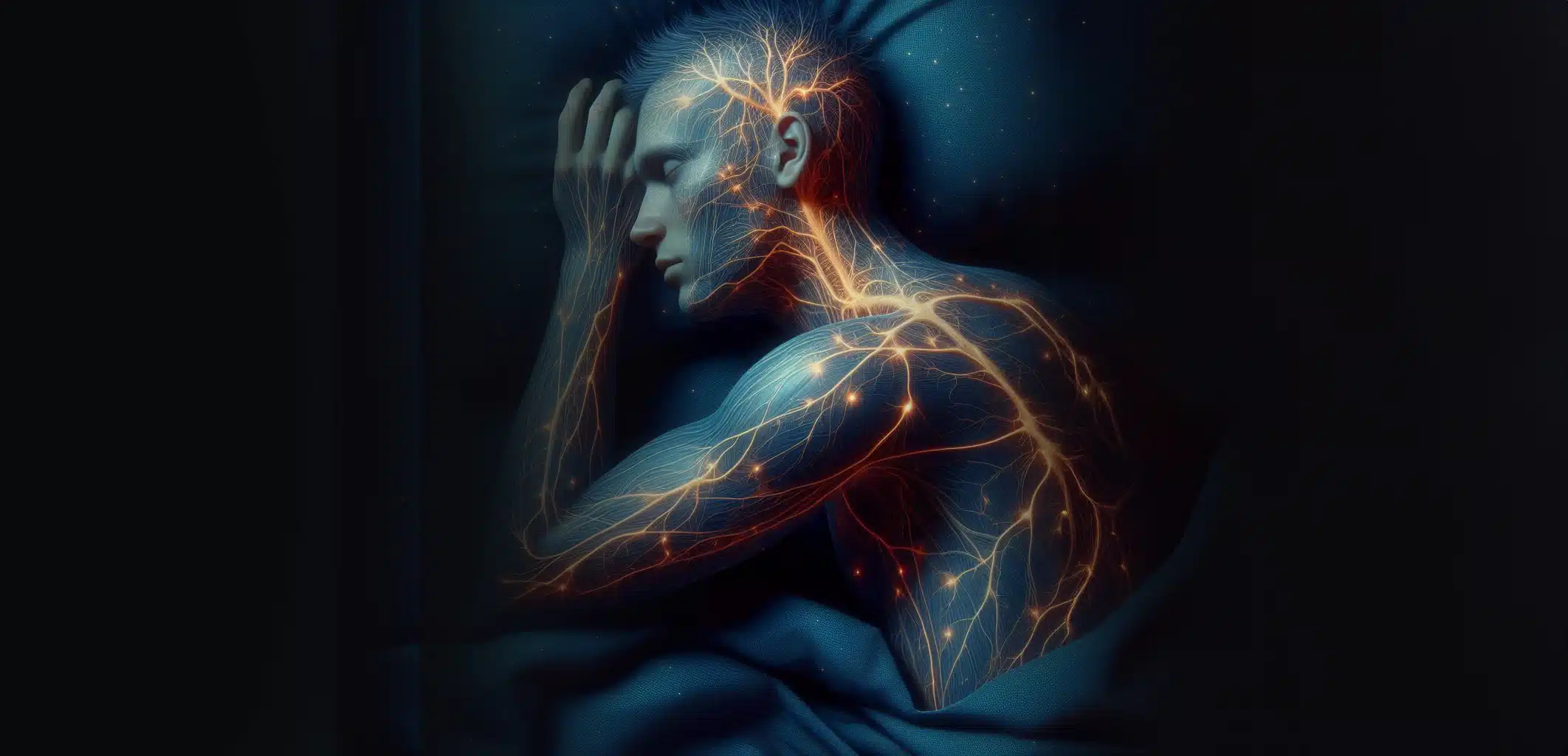Blog
Le mouvement qui transforme des vies

11-01-2024
World Depression Day: A Silent Disease
World Depression Day in our time
World Depression Day is commemorated every 13 January. There are many reasons for doing so, but the main ones are to raise awareness of mental health problems, promote understanding of them and reduce their stigma. Despite its prevalence, depression is still stigmatised in many cultures, making it difficult for people to seek help and support. In this post, we will explore what depression means, how it affects people and what we can do to address this public health problem that, according to the World Health Organization (WHO), affects more than 264 million people worldwide. But what is depression and since when has it been considered a disease, has it always existed or does it belong more to the modern era, and can non-invasive neuromodulation help a person with depression? We commemorate World Depression Day by interviewing psychologist Sandra Nogués, creator of theBeBright method and director of the centre of the same name in Barcelona. But before we talk to her, we take a look at the history of what we mean by depression.
World Depression Day: Definition of the term
We have already explained the compelling reasons why we commemorate World Depression Day every 13 January. A day marked on the calendar because depression is much more than feeling sad or melancholic. Let us remind you that depression is the leading cause of disability worldwide, and can have serious consequences for physical and mental health. It is therefore a mental illness that can profoundly affect the lives of those who suffer from it. People with depression often experience persistent sadness, loss of interest in activities they once enjoyed, fatigue, sleep problems and a marked lack of self-esteem. It can manifest itself in different ways and affect people of all ages, genders and backgrounds.
Depression has been recognised as a mental health condition for centuries, although understanding and treatment of the illness has evolved throughout history. In ancient times, depressive symptoms were described in medical and literary texts. However, stigma and lack of understanding about mental health often led to people with depression being misunderstood or marginalised. Previously, depression was largely regarded as an emotional disorder or a manifestation of weakness of character. It was not until the 20th century that depression began to be widely recognised as a legitimate mental illness.
Interview with psychologist, Sandra Nogués, on World Depression Day
Sandra Nogués has a degree in Psychology from the University of Barcelona and has a professional career spanning more than 25 years, during which she has not stopped training. As our protagonist says, she has more than 47,000 hours of experience in the field of applied psychology, in individual, family and group therapy.
Sandra, welcome. Thank you for taking care of us.
Thank you for giving me the opportunity.
"The pandemic was a traumatic impact on our society both collectively and individually. We were traumatised by several factors. The most relevant was fear: fear of losing our health, fear of losing our loved ones, fear of dying and fear of losing our freedom’.
If we talk about mental health, and more specifically about depression, we can affirm that there is a taboo that has always haunted the term... I don't know if in this sense the COVID pandemic has marked a before and after.
It is true that the term mental health has been associated with a pejorative concept of madness and imbalance. For a long time, society has demonised seeing a psychologist. Seeking psychological help to cope with mental and/or emotional difficulties was seen as weak, inferior and/or vulnerable. It is a great pity that there have been so many prejudices about psychological therapies, as as a consequence it has distanced many people from being able to be helped at levels that neither psychiatry nor conventional medicine can help.
In this sense, it is only recently that the difference between psychiatry and psychology has been understood, as the two disciplines are often confused. In the last decade, many psychiatrists have turned to a more psychological approach. This demonstrates something very important: the tool of psychological therapy is essential and, in many cases, even a priority over medication. The fact that this branch of medicine has approached psychology has had the effect of validating psychology as a fundamental tool for change and transformation of the psyche. All this needs to be emphasised on World Depression Day.
The pandemic was a traumatic impact on our society both collectively and individually. We were traumatised by several factors. The most relevant one to highlight was fear: fear of losing health, fear of losing loved ones, fear of dying and fear of losing freedom.
Fear is one of the most visceral and necessary basic emotions in our brain for survival. Fear has a very important protective function in the face of risk and danger and, consequently, is activated to ensure life and livelihood. It allows me to stay safe. That is why COVID has left a very deep mark on society. It activated the emotion of fear and led us individually to connect to survival patterns and responses. It is important to know that when the state of fear is sustained and uncontrollable, the nervous system activates chronic states of sympathicotonia. This activation can lead to chronic stress, anxiety, sleep problems, obsessive-compulsive responses, tics, digestive dysfunctions, cardiac or metabolic problems, among others. The state of sustained fear activates this sympathicotonia, i.e. our sympathetic nerve is constantly activated to prevent risk and, as a result, we enter into chronic states of stress.
The pandemic clearly marked a turning point in the way we connect with ourselves and our needs or illusions. The way we connect with others and the world. It generated a social state of greater awareness of the present, of sharing and of life around us. I like to see the positive side of every situation, and I believe that this pandemic has brought life and connection back to a sleeping and disconnected society.
Much of the high demand for psychological therapy during and after the pandemic was directed towards symptoms of the impact of the pandemic. However, it is worth noting that many of these people referred to ailments that continued post-pandemic and even became chronic months and years later. This type of somatics speaks of the unconscious decapsulated from our psyche, thanks to the punctual impact of the pandemic.
Some time ago I heard a person say, "I go to a psychologist, and it's not because I'm bad now, it's because I don't want to be bad". Is this correct? Is it good to go to a psychologist for prevention?
You can go to a psychologist for several reasons. The three main ones could be:
- To fix or work on a dysregulation, difficulty or situation of active discomfort that comes from the present.
- To work on the present consequences of a past situation, trauma or difficulty.
- To, being well in the present, seek professional accompaniment with the aim of preventing, avoiding and improving aspects of oneself. For example, to learn to relate better, to know how to manage the nervous system better in certain situations, to focus more attention, among others.
Seeing a doctor should not only be associated with discomfort, mental or emotional problems or psychopathology. This association is a mistake. Our job as psychology professionals is to accompany people in all areas and situations. Whether due to a dysfunction, problem or pathology; or to accompany the person in their personal growth, life purpose and development of tools.
What is clear is that psychology in the 21st century is the profession that can and should help people to develop their full potential and fulfilment.
Congratulations to all the people like the one you mention who turn to psychology to become better people. Prevention is taking the motorway. Easy and fast driving to get where you want to go. There are those who insist on the back road. The path is made by walking, but if you walk with tools and awareness, you will suffer less and stumble less often, you will learn sooner and you will achieve your purpose in less time. It is a choice.
Depression and physical ailments
On the eve of World Depression Day, we want to talk about this illness that affects millions of people around the world. Can depression, if left untreated, become a breeding ground for other physical ailments?
Depression, like many other psychological disorders, is the consequence, not the cause, of our psyche, mind and emotions suffering or suffering something in silence. Something that can come from either the present or the past. Depression is the non-adaptive response to an emotional impact that your psychic system has not been able to manage, process or overcome.
Empecemos por el principio. Si una persona va acumulando sentimientos de malestar relacionados con la tristeza, el enfado, la impotencia y la frustración de forma continuada y prolongada, sin tener herramientas para gestionar esas emociones en su día a día; esas emociones repetidas generarán en la persona, una indefensión aprendida. No puedo cambiar esta realidad, no puedo hacer nada o haga lo que haga nada sirve para cambiar y dejar de sentirme así. Por lo tanto, el cerebro inicia el proceso de anclaje de un patrón en la identidad. Como me veo expuesto a convivir con estos sentimientos y no puedo luchar contra ellos, acaban dando forma a mi identidad, mi personalidad y mis rasgos. Me convierto en una persona depresiva. Mi carácter puede empezar a cambiar, dejar de hacer cosas que hacía, cambiar hábitos a otros menos positivos o abandonarme. A lo largo de los días y semanas, estos estados van definiendo mis patrones de comportamiento, y mi cerebro acaba asociándome con ese formato, y entonces asocio que “yo soy eso”. A pesar de que esa persona no sea yo, sino la consecuencia de los sentimientos negativos sostenidos de los que hablábamos al inicio, acabo comportándome y funcionando desde esos estados. Cuando estos estados se prolongan el tiempo, mi identidad se ve afectada y acabaré dañando una parte de mi yo. Aquí ya tengo un trastorno depresivo.
En el Día Mundial de la Depresión y siempre, es importante recordar que tratar la depresión lo antes posible es fundamental para evitar este proceso de anclaje de estados del yo y de daño en nuestra identidad. La buena noticia es que, por lo general, muchas de las depresiones son reversibles. Sin embargo, es fundamental tener en cuenta que cuanto antes se acuda a un profesional de la psicología, antes y más fácil se podrá revertir el problema. Se necesitarán menos sesiones de tratamiento y un menor tiempo de terapia. Cuanto más tiempo lleve en curso una depresión, más costosa en tiempo y resistencias, es la intervención. Cabe mencionar la relevancia no solo del tiempo que se lleva en depresión, sino también del tiempo que la persona lleva medicada (en caso de estarlo). La medicación puede ser una gran aliada o resultar perturbadora para la mejora, ya que anestesia síntomas y puede generar un mayor efecto de encapsulación del contenido emocional y psicológico a tratar en la intervención psicológica.
Sandra Nogués, psychologist and CEO of BeBright centre in Barcelona
We are talking about an illness that can have multiple faces, i.e. there are many types of depression. When the patient comes in for consultation, is it complicated to obtain a diagnosis in this sense?
Depression can have several forms. These forms are the different somatic signs that the person presents. The most important thing in the diagnosis is the time of evolution of these depressive states, and the intensity of the effect on the person's self-esteem, self-care, behaviours and conduct, and the effect on day-to-day life. Depending on the level of impact on daily life, it is necessary to proceed with intensive psychological therapy, both active and passive, and to refer in parallel to psychiatry for the prescription of medication if the patient's condition significantly affects daily functions and activities. Starting with intensive psychological therapy is essential to be able to accompany the patient in a sustained way in the repair and reconstruction of the emotional states underlying the disorder.
World Depression Day: Symptoms and treatment
Are there warning signs that a person is going through a depressive episode? What are they?
It is important, on the eve of World Depression Day, to remember that there are some clear symptoms of depression, yes, those that we can easily detect and that, if they show themselves in a sustained way, could indicate that the person is not having the resources to regulate present, past or near future situations and/or vital moments.
These are some of them:
- Display of physical exhaustion, lack of energy, general listlessness and slackness. Feelings of general sadness and/or apathy.
- Observe if the person is more restless than usual, shows restlessness and agitation in a way that is not adjusted to the situation, or even if he or she tends to respond more harshly or with responses of anger or rage.
- Difficulty falling asleep, including sleeping fewer hours than usual.
- Low self-esteem, that is, if the person tends to doubt themselves more, to feel more guilty, desperate, or has signs of rejection or hatred towards themselves, the way they are or their body.
Psychology is a science in constant evolution, which means that the professional is constantly studying and searching for new tools to work with in the consulting room, am I wrong?
You are right. A good professional should never stop learning and searching. In my opinion, it is ethically necessary to be in continuous training in order to be able to offer adequate therapeutic help to each person, circumstance, diagnosis, individual need, and vital and social moment.
Society, the human being and the psyche are in constant movement and interaction. Therefore, learning to address the needs of each social stage and phase of the person, through new studies and knowledge, is fundamental for me. The ultimate goal is to be able to address more effectively both existing disorders already known, as well as new pathologies, needs or problems that may arise in humanity.
NESA® Non-Invasive Neuromodulation and its application in cases of depression
Tell me about the non-invasive neuromodulation that you use in your practice, what does it consist of and how do you integrate it into your clinical practice?
At the BeBright Barcelona centre we use our own methodology integrating various psychological orientations, methods, and work and therapy tools. The aim is to work with the human being in a spherical way and in its totality. On the one hand, we have active therapy intervention modules and, on the other hand, passive therapy intervention phases.
Non-invasive neuromoduclation is a passive treatment on the autonomic nervous system. The electrotherapy treatment is almost imperceptible, so it is not invasive for the person who comes for consultation.
Neuromodulation is one of the tools we use in the passive therapy phases. We introduce the approach with non-invasive neuromodulation according to the diagnosis, casuistry of the evolution of the problem, evaluation of the clinical history and the reason for the patient's consultation. We integrate it in parallel with active psychology therapies and other passive neurosensory stimulation therapies. As a rule, we introduce passive therapy with the XSIGNAL® medical device already in the early stages of treatment. It helps us to better activate the neurosomatic circuits, to create awareness more quickly and to unblock the entire somatic memory of past and recent traumas. The therapy helps to increase the reconnection with oneself in an excellent way. When the person comes with dissociation, it is a highly useful complementary tool.
"The autonomic system is the one that somatises what comes from the central system, from the brain. Therefore, when we are sad, angry, anxious, our body may ache or we may have muscular tensions’.
Is it so important to take care of our autonomic nervous system if we talk about mental health? Why?
It is vitally important to take care of the nervous system. The nervous system is the basis of our life, of our structure and where our self, our psyche, lives. The ANS has two interconnected parts: the central nervous system and the autonomic nervous system.
On the one hand, we have the central nervous system, the brain, and the whole structure inside the skull. On the other is the autonomic nervous system, which runs from the brainstem (lower part of the skull) throughout the body. A network of fascia covers our entire body and carries all the information from two very important nerves: the vagus nerve and the sympathetic nerve. The information travels down the spinal column and radiates all organs and the body through this network of fasciae.
The autonomic system is the one that somatises what comes from the central system, from the brain. Therefore, when we are sad, angry or anxious, our body may ache or we may have muscular tensions. When we have negative thoughts, fears or displeasure, our chest hurts, we digest less well or we can't rest well.
The central system sends a whole series of somatic information to the autonomic system that modulates the whole response of the heart, breathing, digestion, for better or worse.
Taking care of the autonomic nervous system involves regulating sleep cycles, eating a good diet, doing adequate physical exercise, breathing and oxygenating the body properly. But not only that, but in order to take care of the autonomic nervous system it is necessary to regulate our responses to anxiety, stress, anger, sadness, negativity, fears, because everything that happens in our mind goes directly to our autonomic nervous system, which is the body and the physiological response.
Benefits of the XSIGNAL® medical device in patients with depression
How long have you been working with the XSIGNAL® medical device and what benefits do you think it brings to your patients?
I started using NESA® medical technology exactly one year ago. The benefits are manifold. I can no longer conceive my methodology without its use.
At BeBright we use this medical technology based on low amperage bioelectric microcurrents in different cases:
- Unblocking physical somatic, recent and past emotions anchored in the body. Release and regulate anxiety and anguish.
- Diminish physical states of phobia.
- To regulate mental and cognitive states.
- Improve memory and attention.
- Improve rest and sleep.
- Treat chronic or temporary illnesses.
- Relieve symptoms of chronic stress.
- Reduce hyperactivity, compulsions and compulsive eating.
- Relieve temporary or chronic pain.
- Unblock and release memories of previous generations, at a psychogenealogical level.
In short, it is a very beneficial therapy to optimise the entire nervous system.
On the other hand, in our BeBright method, we also include as part of the treatment passive home therapy with NESA® driver packs. Unlike passive therapy at the centre, these conductors do not transmit bioelectric currents. The principle of the application of the conductors is to redirect and redirect your own cellular energy to balance yourself and different areas of the body (autonomic nervous system). For this reason there are different protocols for each type of patient. The centre provides individualised monitoring of the treatment that they follow at home. The drivers do not replace the NESA® mother treatment at the clinic, but they do work very well as a complement.
In fact, many patients are surprised when they experience the effects for themselves at home: ‘I sleep better and I haven't slept with this level of depth in a long time’, ‘I am less reactive’, ‘I feel less swollen’, ‘I can control my sugar intake better’, ‘I no longer have pressure in my chest and I don't feel anxious’, are just some of the comments I have received.
For the person it is a great help to be able to regulate themselves between sessions, to have a natural and healthy support that does not always have to go through medication, and to reduce the symptoms that affect their day to day life.
I believe that, in order to do a good job of unblocking the person, the therapy must be integral and for this we need to address the mental part, the emotional part, the behavioural and behavioural area, and the area of the nervous system and, last but not least, the area of life purpose and development or spiritual connection.
Would you recommend neuromodulation to colleagues and patients?
Without hesitation, I would recommend it. I cannot conceive of psychological therapy treatment without passive therapy with NESA® Non-Invasive Neuromodulation.
I have seen that by integrating my BeBright methodology (neuro-bio-psychological method) in collaboration with NESA® bioelectric therapy, I have managed to generate faster and more lasting changes in the mind, in emotional states.
In fact, my recommendation is to take into account the work with the autonomic nervous system. This is the only way to achieve an integral unblocking of the whole system.
Finally, give us an example of a clinical case in which neuromodulation has played a fundamental role.
As a brief example, I could tell you about the case of a woman who came to the clinic with symptoms of agoraphobia, panic, anxiety and severe pain not associated with any medical diagnosis, i.e. psychosomatic. A depressive, obsessive, generalised anxiety and emotional dependency disorder. This woman did not dare to leave the house for fear of anxiety and pain. Her sleep cycles were dysregulated and she did not rest. Very nervous and histrionic. Emotionally fearful, very insecure and dependent.
At that time, my schedule was full with two months to go, and not being able to attend to her quickly, I proposed that, while we waited for a cancellation slot, we work with NESA® passive non-invasive neuromodulation therapy. We focused on three goals: rest, nervous system regulation, and anxiety and pain. She trusted and started the treatment. By the fifth session, surprisingly, she was no longer anxious about leaving the house, she was resting much better, and she looked forward to going outside to walk her dog. She began to regain energy and connectedness with a desire to do things and interact with the world. After two weeks I was able to see her in consultation and we started active therapy with psychological intervention. At the beginning we did one and a half sessions a week of active therapy with me and two sessions a week of passive therapy with neuromodulation. The psychosomatic pain also started to subside and she was able to return to a normal life.
With psychology alone, it would have taken much longer to unblock all the emotional pain anchored in the lower abdomen and memorised in her body.
The results of the union of both therapies within our method, generated after about five months, and in a progressive way, spectacular changes. I am very proud of her effort, discipline, perseverance and trust in me as a professional and in our therapy. Who really wants to be helped, looks for and, in the end, finds the person and the tools that help him/her.
What to do if symptoms of depression are detected
Before we go, on World Depression Day, what do we do if we detect some of those symptoms that indicate a possible depression? What steps should we take?
If you detect symptoms of depression in yourself: stop, write them down, become aware of what is happening to you. Check how long it has been going on. The first act should be to recognise that something is wrong with me. Next, remember that asking for help is for the brave, so seek help from a professional psychologist, because they have the necessary training to be able to deal with this type of problem and will help you with tools so that you can get out of this state. If you don't know of one, ask for referrals or ask friends or family who can recommend where to go. Remember that naturalising that something is wrong with you is a good thing and allows your immediate environment to help you.
If you detect these symptoms in a family member, friend or person around you, my recommendation would be the following.
Ask yourself: Is this person aware of what is happening to them? Can I ask and approach them to make them feel that they are not alone and that I want to help them? Are they open to my help?
We all need to feel that someone understands us and that we are not alone. That what is happening to us is not something strange and that it can be solved. Sometimes, going up to someone and asking them how are you, do you feel sad, and verbalising what you are observing from the outside, allows that person to open up and maybe they can talk about their situation with you. There you can lead and recommend that person to ask for professional help.
Emotional generosity is a natural gift, let's make the most of it.
Sandra Nogués, thank you very much.
Thanks to you.
Find out more about Sandra Nogués, psychologist specialising in non-invasive neuromodulation.
Graduated in Psychology at the University of Barcelona, her professional training has been developed in countries such as: Spain, Switzerland, United States, France and the Netherlands. She has a postgraduate degree in Emotional Education and is trained in Sport Psychology, Coaching Psychology, Psychology of Motherhood and Bonds, Mindfulness and Mental Control, Biological and Psychosomatic Deprogramming, Trauma approach, passive therapy in Neurosensory Stimulation and passive therapy in Non Invasive Neuromodulation NESA® and Polyvagal therapy, among others.
After integrating all this professional and personal background, our guest created her own personalised methodology for each patient, BeBright Method.
She currently runs theBeBright centre in Barcelona, where she concentrates her professional work, both in person and online.
World Depression Day: In search of a healthy lifestyle
While it is true that modern lifestyles can play a role in the development of depression, it is not the only cause, nor is it unique to this era. Depression is a multifactorial condition that can be triggered by a combination of biological, genetic, psychological and social factors. Here are some aspects of today's lifestyle that may contribute to depression:
- Stress: Fast-paced lifestyles, work demands and social pressures can increase stress levels, which in turn can trigger or aggravate depression. Remember that excessive and sustained activation of our sympathetic system is detrimental to our health.
- Digital Connection: Although modern technology connects us to the world at the click of a button, it can also lead to loneliness, constant comparison and addiction to social media, all of which can contribute to depression.
- Lack of Physical Activity: Sedentary lifestyles and lack of exercise can negatively affect mental health. Regular physical activity has been associated with improved mood and reduced depressive symptoms.
- Diet and Nutrition: A poor and unbalanced diet can affect mood and mental health. Eating a nutrient-rich diet is important for emotional well-being.
- Social Isolation: Lack of real, close social interaction can increase the risk of depression. Strong social relationships and emotional support are crucial for mental health.
Before we go, on the eve of World Depression Day, celebrated each year on 13 January, we remember that awareness and support are key to effectively addressing this disorder in today's society.










